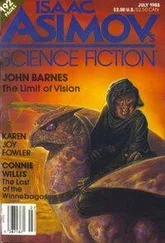In the first fine flush of freedom after the Liberation, I had entertained hopes that it would change everything—that it would somehow do away with inequality and patriarchal dominance and those humorless women determined to eliminate the word “manhole” and third person singular pronouns from the language.
Of course it didn’t. Men still make more money, “herstory” is still a blight on the semantic landscape, and my mother can still say, “Oh, Traci !” in a tone that reduces me to pre-adolescence.
“ Her decision!” Mother said. “Do you mean to tell me you plan to stand idly by and allow your daughter to make the mistake of her life?”
“What can I do? She’s twenty-two years old and of sound mind.”
“If she were of sound mind she wouldn’t be doing this. Didn’t you try to talk her out of it?”
“Of course I did, Mother.”
“And?”
“And I didn’t succeed. She’s determined to become a Cyclist.”
“Well, there must be something we can do. Get an injunction or hire a deprogrammer or sue the Cyclists for brainwashing. You’re a judge. There must be some law you can invoke—”
“The law is called personal sovereignty, Mother, and since it was what made the Liberation possible in the first place, it can hardly be used against Perdita. Her decision meets all the criteria for a case of personal sovereignty: It’s a personal decision, it was made by a sovereign adult, it affects no one else—”
“What about my practice? Carol Chen is convinced shunts cause cancer.”
“Any effect on your practice is considered an indirect effect. Like secondary smoke. It doesn’t apply. Mother, whether we like it or not, Perdita has a perfect right to do this, and we don’t have any right to interfere. A free society has to be based on respecting others’ opinions and leaving each other alone. We have to respect Perdita’s right to make her own decisions.”
All of which was true. It was too bad I hadn’t said any of it to Perdita when she called. What I had said, in a tone that sounded exactly like my mother’s, was “Oh, Perdita !”
“This is all your fault, you know,” Mother said. “I told you you shouldn’t have let her get that tattoo over her shunt. And don’t tell me it’s a free society. What good is a free society when it allows my granddaughter to ruin her life?” She hung up.
I handed the receiver back to Bysshe.
“I really liked what you said about respecting your daughter’s right to make her own decisions,” he said. He held out my robe. “And about not interfering in her life.”
“I want you to research the precedents on deprogramming for me,” I said, sliding my arms in the sleeves. “And find out if the Cyclists have been charged with any free choice violations—brainwashing, intimidation, coercion.”
The phone sang, another universal. “Hello, who’s calling?” Bysshe said cautiously. His voice became suddenly friendlier. “Just a minute.” He put his hand over the receiver. “It’s your daughter Viola.”
I took the receiver. “Hello, Viola.”
“I just talked to Grandma,” she said. “You will not believe what Perdita’s done now. She’s joined the Cyclists.”
“I know,” I said.
“You know ? And you didn’t tell me? I can’t believe this. You never tell me anything.”
“I thought Perdita should tell you herself,” I said tiredly.
“Are you kidding? She never tells me anything, either. That time she had eyebrow implants she didn’t tell me for three weeks, and when she got the laser tattoo she didn’t tell me at all. Twidge told me. You should have called me. Did you tell Grandma Karen?”
“She’s in Baghdad,” I said.
“I know,” Viola said. “I called her.”
“Oh, Viola, you didn’t!”
“Unlike you, Mom, I believe in telling members of our family about matters that concern them.”
“What did she say?” I asked, a kind of numbness settling over me now that the shock had worn off.
“I couldn’t get through to her. The phone service over there is terrible. I got somebody who didn’t speak English, and then I got cut off, and when I tried again they said the whole city was down.”
Thank you, I breathed silently. Thank you, thank you, thank you.
“Grandma Karen has a right to know, Mother. Think of the effect this could have on Twidge. She thinks Perdita’s wonderful. When Perdita got the eyebrow implants, Twidge glued LEDs to hers, and I almost never got them off. What if Twidge decides to join the Cyclists, too?”
“Twidge is only nine. By the time she’s supposed to get her shunt, Perdita will have long since quit.” I hope, I added silently. Perdita had had the tattoo for a year and a half now and showed no signs of tiring of it. “Besides, Twidge has more sense.”
“It’s true. Oh, Mother, how could Perdita do this? Didn’t you tell her about how awful it was?”
“Yes,” I said. “And inconvenient. And unpleasant and unbalancing and painful. None of it made the slightest impact on her. She told me she thought it would be fun.”
Bysshe was pointing to his watch and mouthing, “Time for court.”
“Fun!” Viola said. “When she saw what I went through that time? Honestly, Mother, sometimes I think she’s completely brain-dead. Can’t you have her declared incompetent and locked up or something?”
“No,” I said, trying to zip up my robe with one hand. “Viola, I have to go. I’m late for court. I’m afraid there’s nothing we can do to stop her. She’s a rational adult.”
“Rational!” Viola said. “Her eyebrows light up, Mother. She has Custer’s Last Stand lased on her arm.”
I handed the phone to Bysshe. “Tell Viola I’ll talk to her tomorrow.” I zipped up my robe. “And then call Baghdad and see how long they expect the phones to be out.”
I started into the courtroom. “And if there are any more universal calls, make sure they’re local before you answer.”
Bysshe couldn’t get through to Baghdad, which I took as a good sign, and my mother-in-law didn’t call. Mother did, in the afternoon, to ask if lobotomies were legal.
She called again the next day. I was in the middle of my Personal Sovereignty class, explaining the inherent right of citizens in a free society to make complete jackasses of themselves. My students weren’t buying it.
“I think it’s your mother,” Bysshe whispered to me as he handed me the phone. “She’s still using the universal. But it’s local. I checked.”
“Hello, Mother,” I said.
“It’s all arranged,” Mother said. “We’re having lunch with Perdita at McGregor’s. It’s on the corner of Twelfth Street and Larimer.”
“I’m in the middle of class,” I said.
“I know. I won’t keep you. I just wanted to tell you not to worry. I’ve taken care of everything.”
I didn’t like the sound of that. “What have you done?”
“Invited Perdita to lunch with us. I told you. At McGregor’s.”
“Who is ‘us,’ Mother?”
“Just the family,” she said innocently. “You and Viola.”
Well, at least she hadn’t brought in the deprogrammer. Yet. “What are you up to, Mother?”
“Perdita said the same thing. Can’t a grandmother ask her granddaughters to lunch? Be there at twelve-thirty.”
“Bysshe and I have a court calendar meeting at three.”
“Oh, we’ll be done by then. And bring Bysshe with you. He can provide a man’s point of view.” She hung up.
“You’ll have to go to lunch with me, Bysshe,” I said. “Sorry.”
“Why? What’s going to happen at lunch?”
“I have no idea.”
On the way over to McGregor’s, Bysshe told me what he’d found out about the Cyclists. “They’re not a cult. There’s no religious connection. They seem to have grown out of a pre-Liberation women’s group,” he said, looking at his notes, “although there are also links to the pro-choice movement, the University of Wisconsin, and the Museum of Modern Art.”
Читать дальше












